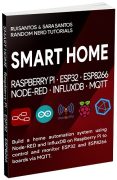By default, the hostname of the ESP32 is espressif. In this guide, you’ll learn how to set a custom hostname for your board.
To set a custom hostname for your board, call WiFi.setHostname(YOUR_NEW_HOSTNAME); before WiFi.begin();

Setting an ESP32 Hostname
Usually, the default ESP32 hostname is espressif or a similar name.

There is a method provided by the WiFi.h library that allows you to set a custom hostname.
First, start by defining your new hostname. For example:
const char* hostname = "esp32-node-temperature";Then, call the WiFi.setHostname() function before calling WiFi.begin(). You also need to call WiFi.config() as shown below:
WiFi.config(INADDR_NONE, INADDR_NONE, INADDR_NONE, INADDR_NONE);
WiFi.setHostname(hostname.c_str()); //define hostnameYou can copy the complete example below (don’t forget to insert your network credentials):
/*
Rui Santos & Sara Santos - Random Nerd Tutorials
Complete project details at https://RandomNerdTutorials.com/esp32-set-custom-hostname-arduino/
Permission is hereby granted, free of charge, to any person obtaining a copy of this software and associated documentation files.
The above copyright notice and this permission notice shall be included in all copies or substantial portions of the Software.
*/
#include <WiFi.h>
// Replace with your network credentials
const char* ssid = "REPLACE_WITH_YOUR_SSID";
const char* password = "REPLACE_WITH_YOUR_PASSWORD";
// Change the hostname
const char* hostname = "esp32-node-temperature";
void initWiFi() {
WiFi.mode(WIFI_STA);
WiFi.config(INADDR_NONE, INADDR_NONE, INADDR_NONE, INADDR_NONE);
WiFi.setHostname(hostname);
WiFi.begin(ssid, password);
Serial.print("Connecting to WiFi...");
while (WiFi.status() != WL_CONNECTED) {
Serial.print('.');
delay(1000);
}
Serial.print("\nESP32 IP Address: ");
Serial.println(WiFi.localIP());
Serial.print("ESP32 HostName: ");
Serial.println(WiFi.getHostname());
Serial.print("RRSI: ");
Serial.println(WiFi.RSSI());
}
void setup() {
Serial.begin(115200);
initWiFi();
}
void loop() {
// put your main code here, to run repeatedly:
}
You can use this previous snippet of code in your projects to set a custom hostname for the ESP32. On the Serial Monitor, you should get the new ESP32 hostname.
Important: you may need to restart your router for the changes to take effect.
After this, if you go to your router settings, you’ll see the ESP32 with the custom hostname.

Note: some routers don’t allow you to change the ESP32 hostname using this method. If that’s your case, you’ll need to change it manually on the router’s administration panel.
Wrapping Up
In this tutorial, you’ve learned how to set up a custom hostname for your ESP32. This can be useful to identify the devices connected to your network easily. For example, if you have multiple ESP32 boards connected simultaneously, it will be easier to identify them if they have a custom hostname.
For more Wi-Fi related functions, we recommend the following tutorials:
- ESP32 Useful Wi-Fi Library Functions (Arduino IDE)
- ESP32 WiFiMulti: Connect to the Strongest Wi-Fi Network (from a list of networks)
- [SOLVED] Reconnect ESP32 to Wi-Fi Network After Lost Connection
We hope you’ve found this tutorial useful.
Learn more about the ESP32 with our resources:









Good idea to set a nice host name. But spaces are not a normally valid character and smaller names are better, so “esp32temp” or “officetemp” are better names. Also, skip the overly complex c++ and just use plain C like in the SSID:
const char* hostname = “esp32temp”;
WiFi.setHostname(hostname);
The valid letters for hostname are a-z 0-9 and -.
I was hoping to access the esp32 via browser using the hostname
In this case I set my hostname to “esp32test”.
I’m able to see that the device connects to the router, and the router shows the LAN IP as well as the hostname above.
I was hoping to access the server via browser at http://esp32test or http://esp32test.local or possibly http://esp32test.home.
None of these work. http://<Esp32'sLanIp> works fine.
Is possible access the device using hostname?
Look at mDNS if you want to use http://esp32test.local
Not having a local DNS server complicates things but the device is apparently getting an IP from a DHCP server, probably in your router. Look and see what HostName is shown in the DHCP address leases for that IP. That should work.
Use mDNS to set a local address.
Update: For a brief moment I got positive results from using
WiFi.config(INADDR_NONE, INADDR_NONE, INADDR_NONE, INADDR_NONE);
WiFi.setHostname(“CustomHostname”);
But not in the way described.
After giving up on WiFi.setHostname() entirely, connecting without it to a static IP, a day later I noticed the ESP was accessible by both the static LAN IP and the customized hostname I’d given it.
Haven’t been able to repeat it since, but it suggests ESP32 remembers a prior WiFi.setHostname attempt such that a subsequent WiFi.config with definitive values (as opposed to INADDR_NONE) gives you the ability to completely control your IP addresses and your hostname, both.
at least in the latest libs (2.0.3), WiFi.setHostname() needs to be called before WiFi.mode(), it is not sufficient to call it before just before WiFi.begin().
I use the following code to get a unique Host Name in the familiar form of “ESP_” plus the last 6 hex digits of the MAC address.
Global Variable:
char Host_Name[11];
Local:
byte mac[6];
WiFi.macAddress(mac);
sprintf(Host_Name, “ESP_%02X%02X%02X”, mac[3], mac[4], mac[5]);
WiFi.setHostname(Host_Name);
With an ESP32-S the above mentioned solution did not work.
However when changing the order of of code to this:
const char* newHostname = “ESP32-Test”;
WiFi.setHostname(newHostname); //define hostname
WiFi.mode(WIFI_STA); // station mode
WiFi.begin(ssid, password);
the newHostname was accepted and reacable via ping ESP32-Test
I tried Heinz’s adaptation and this also had no effect — DHCP request still hardcodes “ESP-C54490”.
I’m using Arduino IDE 1.8.19 with the ESP board support 2.0 (I also tried 3.0-alpha)
Could someone post a complete sourcecode listing that works?
Ideally I am also trying to set MAC address (MAC change works, and would negate need to restart the router). For troubleshooting purposes I just run what’s in this blog post.. and another try using code modified per Heinz’s comment.
I could fill a page of text with all the links I found in Google about how this was broken in Espressif libraries, and then “fixed”, with people saying the problem has come back, but the Espressif Git issues are locked closed..
Without DHCP control, I will have to substitute Raspberry Pis instead.